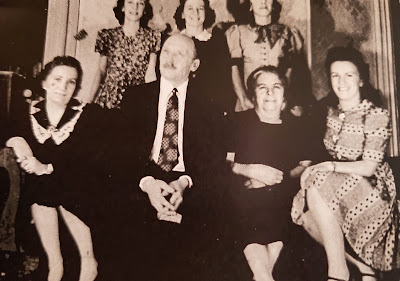The theme for Week 46 is "Poor Man." Like last week, I encourage you to be creative with this theme. How could a person be poor -- financially, "pitiable," poor judgement? Or perhaps you have an ancestor who helped the poor.
 |
| On the boats and on the planes. They're coming to America. |
In the early to mid 1800s, the Italian peninsula underwent a radical transformation. The people were tired of being controlled by outside forces and by countries who have determined their destiny for centuries. Nationalistic sentiment fueled the masses from the snowy mountains near Milan to the sun-drenched islands of Sicily and Sardinia. Beginning in 1814 with the Congress of Vienna, the Risorgimento or Italian unification took place. By 1861, the country was unified as the Kingdom of Italy with Rome becoming the capital. However, things didn't go as nearly as planned.
The northern part of the country quickly became an industrialized powerhouse thanks to their close proximity to Germany, France and other nations that were undergoing the Industrial Revolution. Milan grew to become the fashion capital of the world. Venice once again became an important port of trade and commerce. Florence became a hub for the arts. Things were great in the north! However, the south was struggling as it had been before unification began.
 |
| Gesualdo, Italy |
By the mid 1870s, conditions worsened as disease such as cholera ran rampant. People were feeling hopeless and began to seek refuge by migrating to other parts of the world. That is where my great-grandfather, Giuseppe Carrabs comes in.
Giuseppe was born to farmers Vincenzo Carrabs and Maria Giovanna Capobianco on August 25th, 1882 in the Campanian town of Gesualdo. His parents no doubt experienced unification firsthand as they were born in the 1850s and were quite young when the country was finally unified. Unification woes aside, the family did have many children. Some unfortunately died young. Some stayed in Italy while Giuseppe and his brothers Rocco and Pasquale left for America with their sister, Rosina.
He married Clementina Forgione on March 11th, 1905 and had the following children:
Born in Gesualdo:
1. Vincenza (Jennie): 1907-1984
2. Olimpia (1912-1913)
Born in Haverhill:
3. Josephine (1915-1997)
4. Eleanor (1916-2003)
5. Louise (1918-2010)
6. Olympia (1920-2002)
Shortly after the untimely death of the first Olympia, Giuseppe, Clementina and their young daughter set sail for America. They probably did this because conditions at the time were not conducive to raising a family. Let's not forget that shortly after her death, World War 1 started. That must have been a pretty big incentive to get out of the country!
The death of Olimpia had such a profound effect on the couple that she was spoken of only rarely. I only found out about her a few months ago because my dad's cousins asked me to look up information on the missing Carrabs daughter.
 |
| Giuseppe Carrabs and Clementina Forgione |
Giuseppe passed away on May 9th, 1974 in Haverhill and was often remembered by his daughters and grandchildren as being warm and caring. Because of his nature, the family in Melrose and Everett stayed in touch over the years.
Every Italian immigrant has a story similar to this one as hundreds of thousands of people left the peninsula in search of a better life. Some ended up staying in America for a short amount of time and ended up returning to their homeland. Some, like my great-grandfather and his siblings decided to stay in America in the hope of making a better life for themselves. In total, more than four million Italians from all over Italy left the country for places such as America, Brazil, Argentina between 1880 and 1924. The majority of these people were from the poverty stricken south.
I picked my great-grandfather to talk about for the "Poor Man" segment because the plight of immigrants leaving their homeland still resonates today. If we understand why people left in the first place, we could better understand their situations which can often be far worse than poverty stricken communities. Giuseppe or Joseph as he was known in America grew up in a time of great social upheaval. Southern Italy was denied a great many things that the north had in abundance.
However, things weren't always that great in America as prejudice and distrust was commonplace. I'm not entirely sure how much of that my great-grandparents faced. I do know that it was probably hard for them to leave their families in Italy and come to a strange land with little possessions.
I'd like to think that despite coming from absolute poverty, things did turn out for the better for them. Back in Italy, things have certainly improved in the decades since Giuseppe and Clementina last set foot on Italian soil. I recently found out that they have been immortalized on Ellis Island's "Wall of Honor" thanks to my dad's cousin, Dennis and his wife! For those who don't know, the Wall of Honor is a monument dedicated to immigrants from all walks of life and almost every country on Earth. On there are many Italians including my great-grandparents.
Life wasn't easy for my great-grandparents. But, in the end I'd like to think that despite coming from poor conditions in southern Italy, he and his family left their mark on the world in small ways. You can still come from poverty and still manage to have an impact. That's the lesson I'm taking from this story!
 |
| Giuseppe and Clementina Carrabs and their daughters. |
~1.5 million Italians migrated to Brazil.
About 3 million Italians settled in Argentina.
Italians are the 7th largest ethnic group in Canada.
About 15% of all Mexicans have full or partial Italian descent.
>4 million to U.S.A.
Italian Americans make up 6% of the US population and are the 4th largest ethnic group in America.
Images of Google Earth are property of Google Earth.

No comments:
Post a Comment